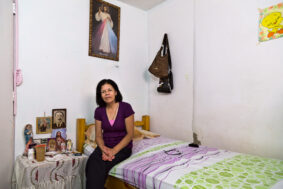Caracas Caregivers
Caracas Caregivers
There are thousands of people in Caracas who depend on another’s help to have the possibility of meeting the demands the-day-to-day routine imposes on all human beings. The aging of societies poses the problem of caring for dependent people. Caring work is considered as something inherent to every culture, and it is the woman who throughout history has been responsible for caring about the family health. It is the woman who assumes caring as a moral commitment marked by affection, with a high social cost for her; she takes it as a responsibility, or as an imposed task. Most women assume this poorly paid and invisible role as an obligation that must be offered by the female gender naturally.
In most of the cases, our society has assigned women the work of caring, something that has marked the lives of many, for that is a deferred but, sometimes, invaluable role that represents the subsistence of gender inequalities. There are situations where the caregivers are the dependent person’s family members; some of them do it as an obligation, while others, voluntarily. In the case of female workers, these caregivers become a continuation, or substitution, for such family members within the household.
Caregiver-dependent relationships create complex stories that mark the caregiver’s life. Work overload entails problems in their mental and physical health, as well as economic and family consequences related to their social relations and spare time. A common component in most cases is their feeling of loneliness and desolation. In assuming this responsibility, and accepting the moral and social duty of taking charge, women put aside their aspirations. That time they spend providing care prevents them to accessing the business world, nor having the possibility of improving their socio-economic status.
Caregivers are a vulnerable group within our society who deserve a better quality of life. This series of portraits were taken within the dependent persons’ rooms. These female caregivers who always give often don’t receive anything in return. Who takes care of them, whom always take care of so many?










